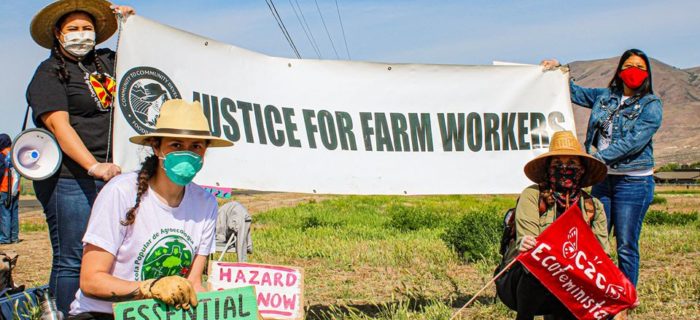News and Views: Summer 2020
To read the News and Views in full, click here.
Food First Supports Farmworker Organizing During COVID-19
Supporting farmworkers who are organizing for safer, healthier working conditions and wages is a critical step towards building a just food system. That is why, on April 23rd, Food First’s Erik Hazard sat down with farmworker organizers and allies for a discussion on the COVID-19 pandemic and the challenges and opportunities it has created for farmworker communities. With over 500 people attending, the webinar served as a tool for political education on worker organizing and capitalism’s relationship to immigrant farm labor in our food system
Erik was joined by four panelists: Edgar Franks of Familias Unidas por la Justicia, an independent farmworker union of indigenous families located in Burlington, WA, representing over 500 Triqui, Mixteco, and Spanish-speaking workers at Sakuma Brothers Farm; Lucy Lopez and Australia Hernandez, who are organizers with Community to Community, a Bellingham, WA-based, women-led grassroots organization dedicated to food sovereignty and immigrant rights; and David Bacon, a labor photojournalist who has extensively covered farmworker issues and who once was an organizer himself.
We started off by discussing what it means for agricultural labor, considerably undervalued by capitalism before the COVID-19 pandemic, to now be considered “essential” by the government. Panelists noted how farmworkers and other food workers have always been essential to our food system. But despite their new, official status, farmworkers continue to face the threat of a racist immigraiton enforcement system while receiving no economic benefits (or government assistance).
The webinar was framed so attendees could better understand the relationship between agricultural workers, our immigration system, and our capitalist food system. As David Bacon succinctly put it, “In the capitalist agriculture system in the US, the workforce has always been made up of people coming from somewhere else, going back to slavery.” Edgar Franks further articulated how capitalist agriculture feeds off an antagonism at the heart of American history, stating “there [has] always existed a contradiction about who is worthy to receive recognition as a human being and who is secondary.” This antagonism is clearly evident in the present period where an entire for-profit food system is dependent on a displaced, precarious workforce mainly from Latin America. Today’s immigrant agricultural workforce in the US is around 95% Mexican, with around half being undocumented. Decades of economic policies, largely driven by the United States and Mexico’s own ruling class, have forced many former farmers and workers from Mexico to migrate North and become wrapped up in a brutal immigration enforcement system. As Australia Hernandez noted, this system continuously helps to “produce new workers that our system can exploit for cheaper food,” while also making it incredibly dangerous and difficult to organize for workers’ rights.
The panelists also covered how the COVID-19 pandemic may be acting as a catalyst to set the US on a dangerous trajectory for the future of agricultural labor. President Trump’s administration is attempting to use this crisis as an opportunity to expand the H-2A guestworker program, a highly unjust, temporary visa program that Food First has criticized in the past. Panelists noted that the Trump administration, following a trend set by previous administrations including the Obama administration, was using this system of labor to further control immigrant labor. An expansion of H-2A could be used to negatively impact wages for all farmworkers while also undermining labor organizing and unionizing efforts in the fields. The Trump administration and large growers are pushing an expansion of the H-2A system to maintain a supply of highly exploitable labor that limits permanent residency, rather than promoting stronger rights, better wages, and humane conditions so all farmworkers can work with dignity. Preventing growers and the US government from expanding this unjust program is a growing battle for the future of food justice.
The webinar made it clear that farmworkers are experiencing deteriorating health and safety conditions while receiving no help from recently passed federal relief packages. However, as Edgar Franks stated, “In order to receive some kind of worthiness of being human, it has always come through a struggle, through a fight, by organizing.” And COVID-19 may be providing new opportunities for organizing, which was covered in the final part of the webinar.
Stay in the loop with Food First!
Get our independent analysis, research, and other publications you care about to your inbox for free!
Sign up today!Panelists conveyed that the public is now clearly seeing our capitalist food system as inefficient, unsustainable, and inherently unjust for workers. As officially deemed “essential” workers, there is an opportunity during this crisis for farmworkers and communities to push back. Strengthening abilities to take action at work and collaborating with communities to build public support will be crucial in the coming months to improve conditions on the ground. As David Bacon said, we need to organize and “cross that enormous gulf that exists between rural areas and cities […] When that happens we can win.”
If you missed the webinar, you can view the recording at https://archive.foodfirst.org/farmworkers-covid-19-and-our-capitalist-food-system-webinar/.


 Help Food First to continue growing an informed, transformative, and flourishing food movement.
Help Food First to continue growing an informed, transformative, and flourishing food movement.




